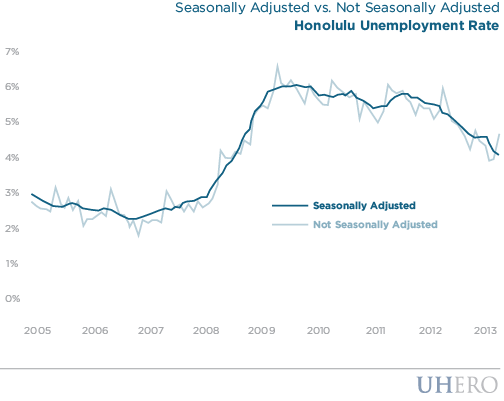BLOG POSTS ARE PRELIMINARY MATERIALS CIRCULATED TO STIMULATE DISCUSSION AND CRITICAL COMMENT. THE VIEWS EXPRESSED ARE THOSE OF THE INDIVIDUAL AUTHORS. WHILE BLOG POSTS BENEFIT FROM ACTIVE UHERO DISCUSSION, THEY HAVE NOT UNDERGONE FORMAL ACADEMIC PEER REVIEW.
By Kimberly Burnett and James Jones
Last week’s Star Advertiser reported that Honolulu’s unemployment rate increased from May’s 4.0% to 4.7% in June. Is the local labor market in free-fall? Not exactly. When students graduate or are released for summer break, many of them start searching for employment. Suddenly the labor market is flooded with thousands of additional young men and women; some looking for their first full-time positions and others looking to earn spending money to bring back to school in the fall. Since not all of them find employment immediately, this often contributes to a noticeable uptick in the unemployment rate from May to June both locally and nationally. The reverse often occurs in August and September as students return to classes and exit the labor force. This is just one example of a seasonal fluctuation that can make it difficult to assess the current state of the economy. How can we tell what part of the uptick in the unemployment rate is due to regular seasonal events and what part, if any, is due to changes in underlying economic conditions? Is there a better way for us to see if the economy is on the right track and whether job seekers are getting matched up to the supply of jobs?
Rather than comparing unemployment rates directly across months, adjustments can be made to the data to remove predictable and consistent seasonal effects, the ones that happen every year (like summer vacation and Christmas), from the data. When we observe a seasonal trend that happens at the same time every year, we can use seasonal adjustment, a statistical method, to adjust the data and strip out seasonal fluctuations. The resulting seasonally adjusted series contains fluctuations that are due to factors other than regular seasonal patterns. This way unemployment rate data can be meaningfully compared across different months, and can give us a better indication of the health of the job market.
While the BLS seasonally adjusts national and state unemployment rate they do not provide this adjustment for metropolitan areas or counties. UHERO has developed techniques for seasonally adjusting unemployment rates for Honolulu as well as Hawaii’s three neighbor island counties. According to UHERO’s estimates, after removing the seasonality associated with increased summer demand for jobs, June unemployment in Honolulu actually fell from 4.1% in May to 4.0% in June.
